Ship without fear
AI agents that protect production by watching every change, investigating incidents, and preventing issues — right in Slack.

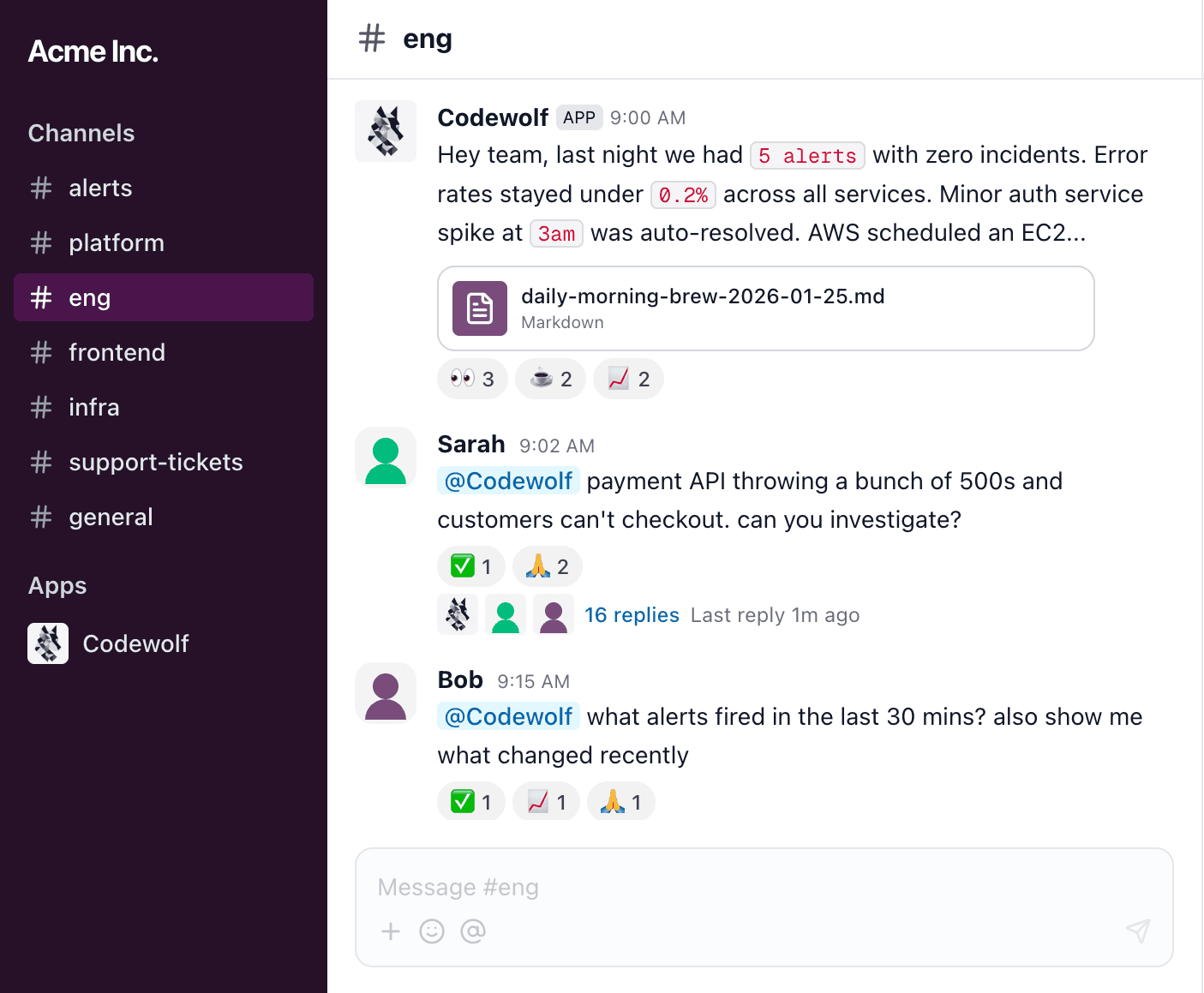
How Codewolf works
Codewolf orchestrates multiple specialized agents per task, continuously updates a shared context graph, improves its own skills from integrations and its own traces, and gets better over time like a real engineer.
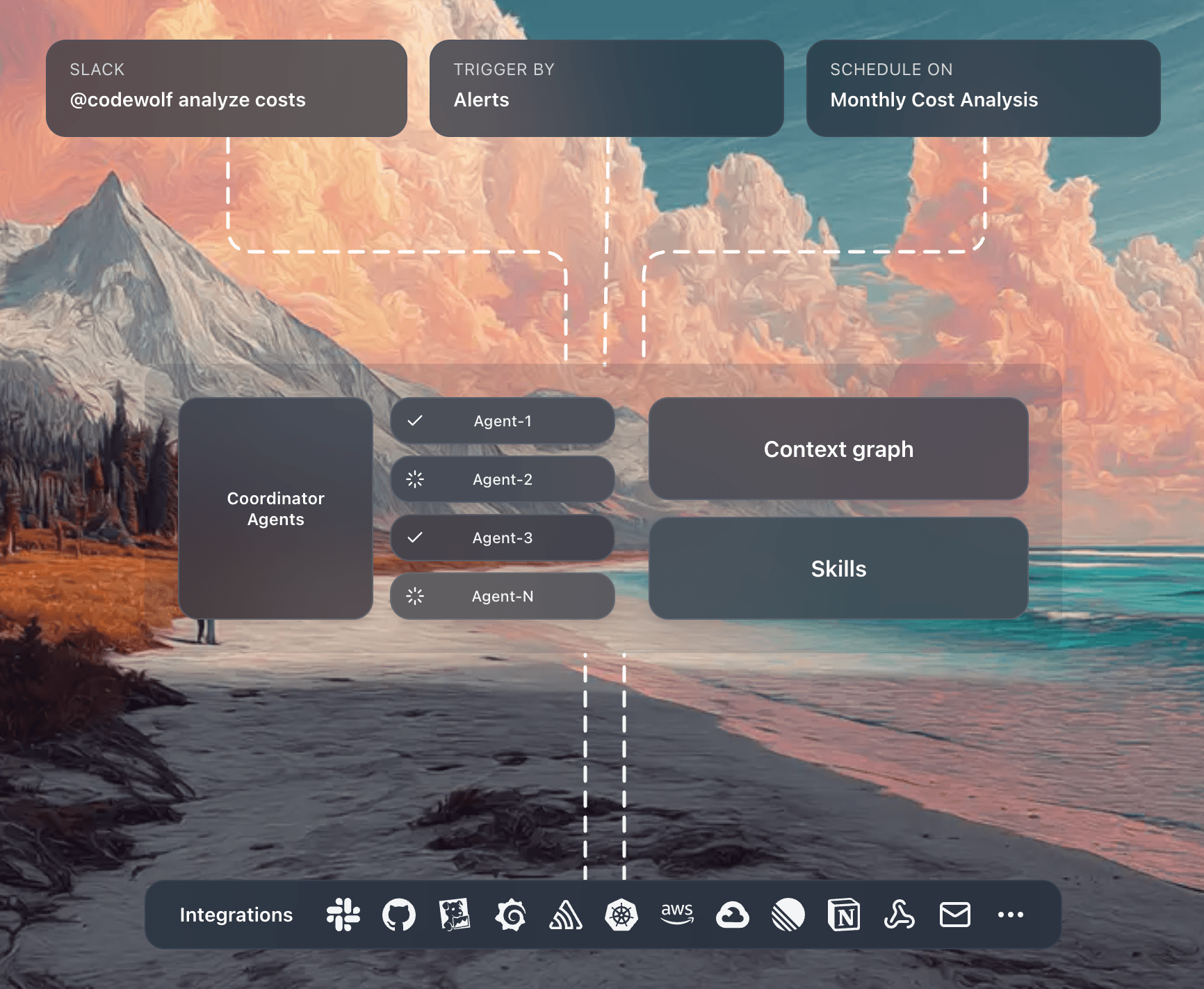

Slack
@codewolf investigate incidents
Trigger By
PRs
Schedule On
Daily Error Report at 9 AM
Context graph
Agent Skills
Codewolf in action
Investigate incidents faster, prevent production issues, and automate recurring operations in Slack.
Investigate
Tag @Codewolf in Slack when issues strike. AI agents analyze deployments, correlate logs across services, trace requests, and identify root causes. From alert to diagnosis in minutes.

Elevated error rate on checkout (>5%), Current Value: 12.8%, Threshold: 5%
error_rate(checkout-service, env:prod) > 5%@Codewolf can you investigate this alert?
On it Sarah! Assigning agents to investigate the checkout error rate:
I'll report back with findings shortly.
Here's what I already know from recent events:
Investigation Complete
🔴 Checkout service confirmed DOWN — returning 504 Gateway Timeout
1️⃣ Root Cause Analysis: Backend service failures cascading to frontend — 92% confidence
Evidence:
- flagd feature flag service — resolveBoolean operations failing (14 error traces)
- product-reviews service — OpenAI gpt-4o-mini API calls failing (5 error traces)
- frontend — getServerSideProps / failing when calling downstream services (12 error traces)
- frontend-proxy — 44 error traces, ~4.3% error rate
Error Propagation Chain:
↓
product-reviews → OpenAI API ❌
↓
frontend (getServerSideProps /) ❌
↓
frontend-proxy → 504 Gateway Timeout
Affected Pods:
- frontend-proxy-b6fb5b44f-5wzr9
- frontend-78cf8ff86d-pxvfr
- flagd-7bd55d47bb-fmcqm
- product-reviews-cdc7c8c5f-mpmhk
Recommended Actions:
- 1️⃣ Immediate: Check flagd pod health — feature flag failures are affecting multiple services
- 2️⃣ Immediate: Verify OpenAI API key/quota for product-reviews service
- 3️⃣ Consider restarting flagd if it's in a bad state
Would you like me to dig deeper into the flagd or product-reviews failures?
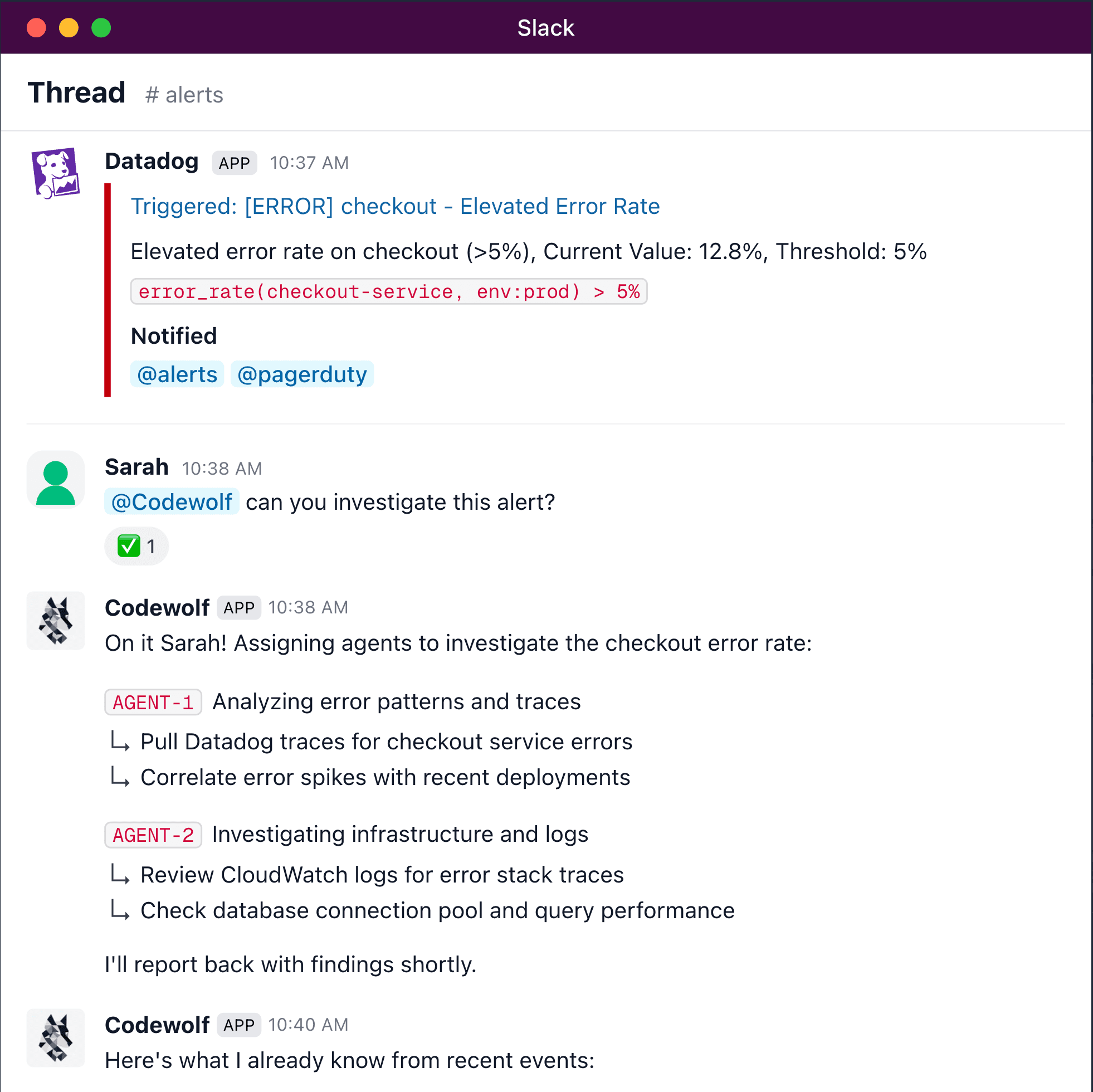
Prevent
Catch issues before they reach production. AI agents review PRs for risks and run post-deployment checks. Stop problems before they become incidents.

PR #2891 opened by alex: Add transaction status column to payment-service
Reviewed this PR and found potential production impact
- Migration adds non-nullable column to transactions table (847M rows)
- Will lock table during backfill, estimated 12-15 minutes
- Could cause payment processing downtime during peak hours
View full review on GitHub
frontend-service v2.4.1 deployed to production • View commit
On it! I see frontend-service v2.4.1 just deployed. Running post-deployment checks:
Will report back in 15 minutes if I see anything suspicious.
PR #2903 opened by jordan: Scale RDS instance for production database
Reviewed Terraform changes and found infrastructure impact
- Scales RDS from db.r6g.xlarge → db.r6g.2xlarge
- Cost increase: ~$620/month additional AWS spend
- Requires 3-5 minute downtime window for instance modification
- Recommend scheduling during maintenance window (Sunday 2-4 AM UTC)
View full analysis on GitHub
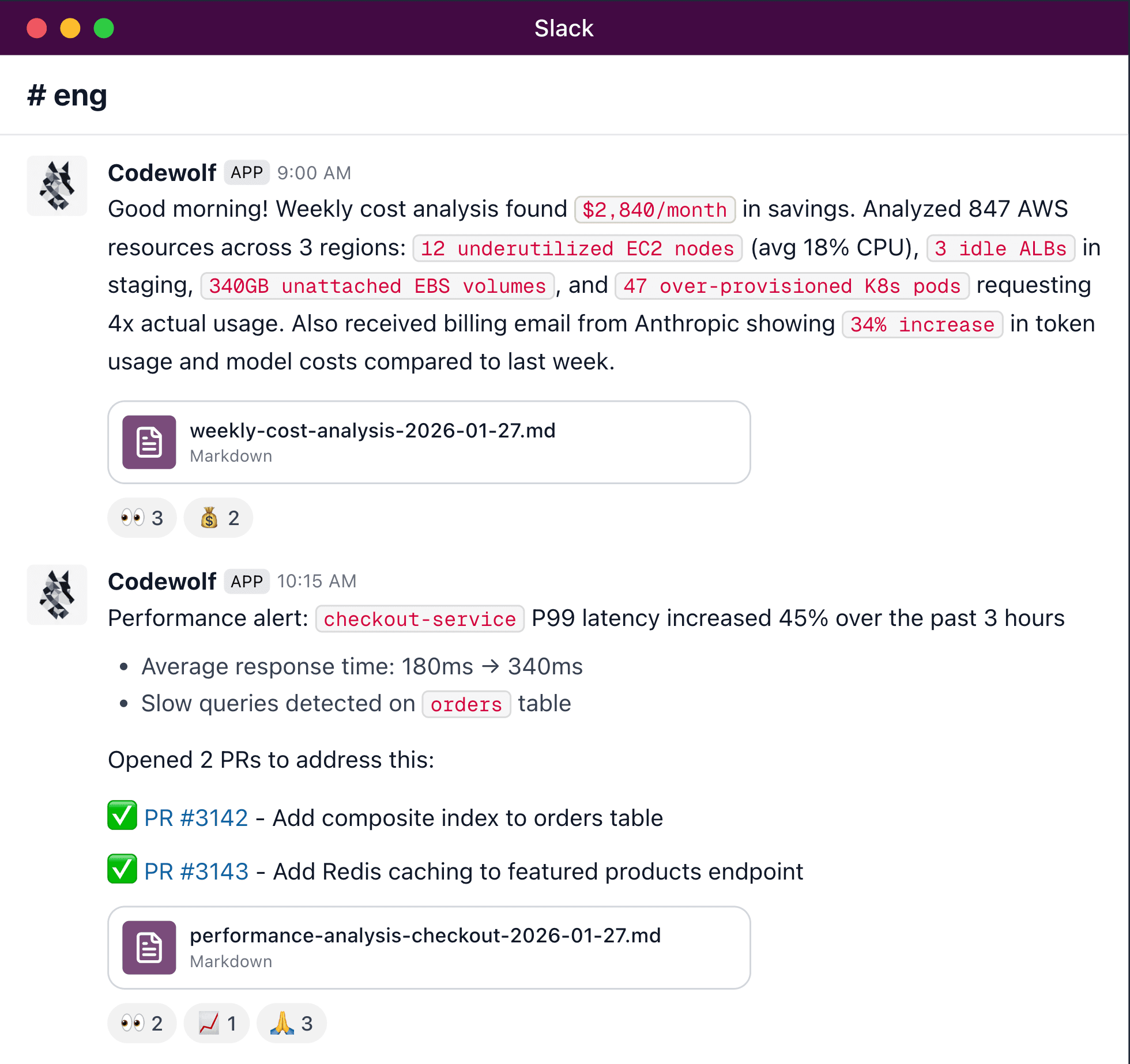
Automate
Agents run on schedule and on change, delivering proactive reports and early warnings in Slack.

Good morning! Weekly cost analysis found $2,840/month in savings. Analyzed 847 AWS resources across 3 regions: 12 underutilized EC2 nodes (avg 18% CPU), 3 idle ALBs in staging, 340GB unattached EBS volumes, and 47 over-provisioned K8s pods requesting 4x actual usage. Also received billing email from Anthropic showing 34% increase in token usage and model costs compared to last week.
Performance alert: checkout-service P99 latency increased 45% over the past 3 hours
- Average response time: 180ms → 340ms
- Slow queries detected on orders table
Opened 2 PRs to address this:
✅ PR #3142 - Add composite index to orders table
✅ PR #3143 - Add Redis caching to featured products endpoint
Daily traffic trends from PostHog: 12.4K unique visitors (↑18% vs yesterday). /pricing page load time increased to 2.8s (was 1.4s) affecting 34% bounce rate. Product signup conversion dropped from 8.2% to 6.1% after yesterday's checkout UI update.
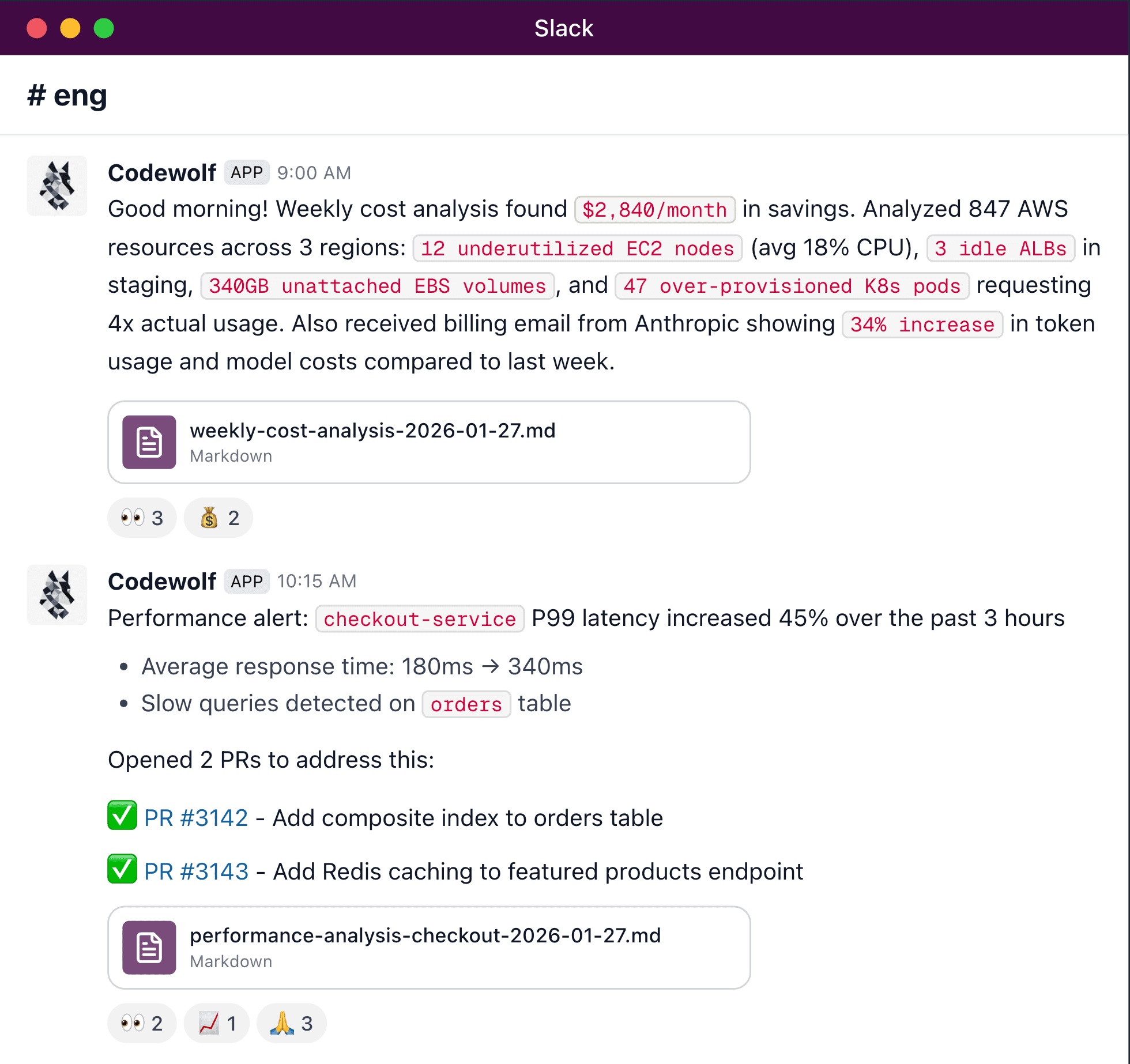

SOC 2 Type II Certified
Independently audited security controls
Isolated Sandboxes
Agents run in dedicated environments with no cross-customer access
AES-256 Encryption
Data encrypted at rest and in transit
SSO/SAML Support
Enterprise authentication with role-based access control
Full Audit Logs
Complete visibility into all agent actions
Your Data Never Trains Models
Your data stays private and is never used for training
Enterprise grade security
Codewolf agents run inside isolated sandboxes with scoped credentials and full audit trails so you can automate agentic workloads without giving up control.
EXPLORE THE TRUST CENTER →Frequently asked questions
Usage pricing
Start with included credits. Scale with pay-as-you-go.
Growth
For growing teams shipping fast
- 500 Included Agent Unit Credits
- Unlimited users
- Standard support
Enterprise
Custom solutions for large organizations
- Custom integrations
- SSO/SAML
- Dedicated support